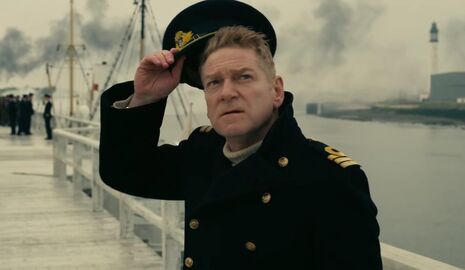Review: Saving the memory of ‘Dunkirk’
Experiencing Christopher Nolan’s latest in all its 70mm IMAX glory, Lillian Crawford finds Dunkirk to be a sensory and historical masterpiece of ground-breaking proportions

The prospect of an invisible enemy is tantalising; as much as the absence of the eponymous great white in Jaws fills the beach with biting dread, so too do the looming German soldiers closing in on Dunkirk. There is a more fearsome foe at large than Fritz, however, omnipresent throughout Christopher Nolan’s filmography. Passing gunshots, bombs, and torpedoes, Time’s winged chariot hurries nearer with every growl of the Luftwaffe.
"Nolan has mastered the art of simplicity, rarely sentimentalising and instead focusing on the grit and toil his protagonists face."
Be it the explosive potential of Bane in The Dark Knight Rises, or the rapid aging of humans in Interstellar, the ticking of Nolan’s watch has pounded through ten feature films to date, quite literally in the case of Dunkirk. Recorded and integrated into the score expertly by Hans Zimmer & Co., the sound pounds and roars as much as the visual spectacle on display. The decision to add to this a fifteenth variation on Sir Edward Elgar’s ‘Enigma’ is nothing short of bold, yet its patriotic refrains move Nolan’s magnum opus to a rousing finale, albeit a somewhat too conclusive one. By the rolling of the credits, the job is hardly done.
Zimmer’s soundtrack weaves together Dunkirk’s narrative triptych almost seamlessly, endeavouring to encompass land, sea, and sky. The time differences of these strands are hardly the mind-bending dream states of Inception, but rather serve to prevent the lack of dialogue allowing the tension to diminish. Unlike some of his more philosophically or scientifically complex screenplays, here Nolan has mastered the art of simplicity, rarely sentimentalising and instead focusing on the grit and toil his protagonists face. More may be said in the silent exchanges between comrades than in Churchill’s ‘fight them on the beaches’ speech, read aloud monotonously at the close by Fionn Whitehead without its typical pomp and bluster.
‘Historical reality’ is, according to Nolan, the aim of this mighty effort, and he comes closest to this by distinguishing micro from macro. These characters are not individuals, but amalgamations of eyewitness accounts that render them strikingly human, enlarged disproportionately by an IMAX camera daringly placed in the cockpit of a spitfire, or the helm of a fishing boat. Reminiscent of Quentin Tarantino’s claustrophobic use of Ultra Panavision 70 in The Hateful Eight, gazing into the eyes of Tom Hardy’s fighter pilot and Mark Rylance’s fisherman through the lens of a 70mm IMAX camera recreates an uncomfortably intimate portrait of these characters. It elevates them to a position of visibility where they undoubtedly belong.
The contrast to the glorious aerial shots is breath-taking. While Joe Wright’s sustained shot of Dunkirk in Atonement had represented cinema’s finest take on Operation Dynamo, the resolution and clarity achieved by Director of Photography, Hoyte van Hoytema, is unprecedented. Overly exposed to modern computer-generated planes and greenscreens, watching real spitfires waltz through the mist is a rare treat, making for a more tangible experience of war. Were it not for the occasional water droplet landing on the camera lens, admittedly a minor tarnish on an otherwise immaculate picture, the realism may have remained unbroken.
As with Hardy and Rylance’s remarkably understated performances, it is an ensemble piece that never allows for a single actor to stand alone. Indeed, the positioning of Dunkirk’s best-established star, Kenneth Branagh, as the commander on the Mole overseeing the rescue of newcomers Whitehead and Harry Styles seems well-placed. With thousands of extras behind them, the namelessness of the majority of the cast, including Cillian Murphy as ‘Shivering soldier’, enhances the refusal to narrow the camera’s focus to single agents. It is an achievement to do so without the cost of character development - a tear will be brought to every eye when the Little Ships of Dunkirk appear on the horizon regardless.
A shattering experience that ensnares every sense, Christopher Nolan has perfected the historical genre with a masterful depiction of war. A future classic that will ensure the 400,000 saved at Dunkirk will never be forgotten
 News / Right-wing billionaire Peter Thiel gives ‘antichrist’ lecture in Cambridge6 February 2026
News / Right-wing billionaire Peter Thiel gives ‘antichrist’ lecture in Cambridge6 February 2026 News / Cambridge students uncover possible execution pit9 February 2026
News / Cambridge students uncover possible execution pit9 February 2026 News / Epstein contacted Cambridge academics about research funding6 February 2026
News / Epstein contacted Cambridge academics about research funding6 February 2026 News / Man pleads guility to arson at Catz8 February 2026
News / Man pleads guility to arson at Catz8 February 2026 News / John’s duped into £10m overspend6 February 2026
News / John’s duped into £10m overspend6 February 2026










